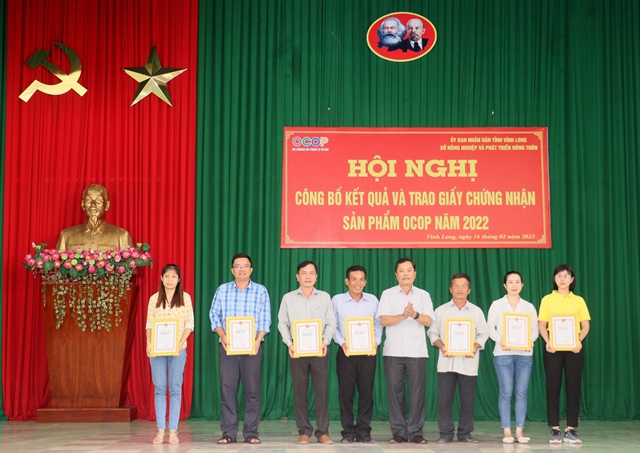 Society
Society

 |
| Vĩnh Long Province grants certificates for OCOP products it recognised last year. – VNA/VNS Photo Lê Thuý Hằng |
VĨNH LONG – The Cửu Long (Mekong) Delta province of Vĩnh Long is fostering the development of products under the country’s “One-Commune-One Product” programme to develop its rural economy.
OCOP products include commercial products and services such as food and beverages, handicrafts, herbal products, and rural tourism.
Four years after the programme began, the province has 107 OCOP products, including 72 three-star and 35 four-star ones, according to its Department of Agriculture and Rural Development. The highest rating is five-star.
Last year the province recognised 39 new products.
Nguyễn Văn Liệt, deputy chairman of the province People’s Committee, said the programme had promoted local advantages and helped develop value chains for various products and promote start-ups and rural development.
The Sáu Ri Company Limited in Long Hồ District got its Ri 6 durian and dried durian recognised as four-star OCOP products in 2019.
Nguyễn Minh Hậu, director of the company, said this had enhanced the prestige of the products and demand for them.
His company had exported the two products to many foreign markets such as Australia, Canada and the US.
“My company’s revenues have been increasing by 10-15 per cent a year.”
In recent years the province has spent VNĐ600 – 800 million (US$25,000 -34,000) annually on implementing the programme, improving human resource quality and assisting OCOP producers.
Văn Hữu Tài, owner of a Mekong spirulina processing start-up in Long Hồ District’s Tân Hạnh Commune, was offered assistance to develop his product to get three stars.
His products had become better known and sales had increased because of the support from the programme, he said.
The programme has helped improve the value of products and rural incomes, according to the province’s Rural Development Sub-department.
It has promoted the role of the community in preserving and developing craft villages and traditional products, and helped develop farming areas for growing clean materials, hi-tech agriculture areas and the rural economy.
But most co-operatives, co-operative groups and households produce and sell their OCOP products through traders, do not focus on design and lack market information.
Liệt said OCOP producers should strive to improve quality and design to increase value.
Relevant agencies and localities should strengthen advocacy to enhance public awareness about the benefits of the programme and choose promising and advantaged products to register for the OCOP programme, he said.
The role of co-operatives, companies and craft villages in developing value chains for OCOP products should be promoted, he said.
More trade promotion activities for OCOP products need to be held, places for displaying and selling them should be established, and they should be developed in combination with rural tourism services, he added. – VNS




